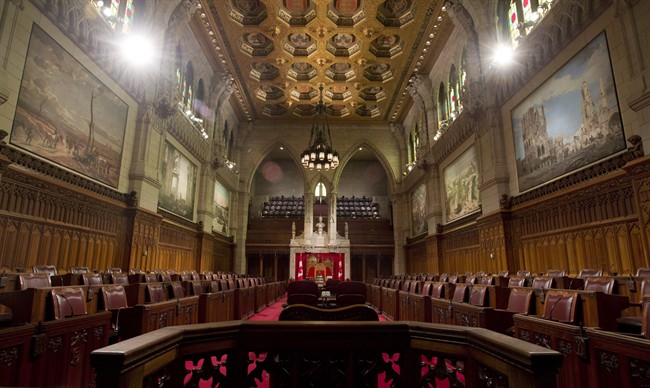Stephen Harper has announced that he will stop appointing new senators, a policy which would lead to the slow demise of the chamber over time. The real business of Parliament is done in the House of Commons, he said.

READ MORE: Harper announces moratorium on new Senate appointments
People love to debate the usefulness of the Senate. It has been talked about as a chamber of “sober second thought” – intended to rise above partisan leanings to carefully review legislation for things that the elected politicians in the House of Commons might have missed.
But, the criticism goes, Senators also often rubber-stamp legislation based on their own partisan leanings. At times, however, the Senate has delayed or returned legislation to the House. Whether or not this was a good idea might depend on your views of the piece of legislation itself, and such moves by the Senate can be controversial.
Here are some notable times that the Senate has reviewed and rejected or delayed House of Commons legislation.
- B.C. officer alleged sexual assault, CSIS had her investigated
- Alberta to overhaul municipal rules to include sweeping new powers, municipal political parties
- Military judges don’t have divided loyalties, Canada’s top court rules
- Norad looking to NATO to help detect threats over the Arctic, chief says
The Naval Aid Bill in 1912-13
In the period before the First World War, the British government was looking to grow its navy, and asked its colonies for money to help do this. Liberal prime minister Wilfrid Laurier had a different idea and decided to create a Canadian navy, rather than contribute directly to the British one.
It was a controversial decision in some circles, and soon after the Conservative Sir Robert Borden was elected in 1911, he decided to contribute some emergency funds to Britain for the construction of dreadnought battleships.
After significant debate, the bill passed the House of Commons, but was defeated by the Liberal-majority Senate. At the time, the Senate said, “This House is not justified in giving its assent to the bill until it is submitted to the judgement of the country.”
Not much later, World War I broke out.
Free trade in 1988
Free trade with the United States was a huge issue in the late 1980s. Prime Minister Brian Mulroney was in favour of the deal, but not everyone in Parliament was.
The Liberal-majority Senate delayed Mulroney’s free trade bill in 1988, eventually leading the prime minister to call an election on the issue. He was re-elected with a majority, and a new bill was quickly passed in the new Parliament.
The Abortion Bill in 1991
In the late 1980s, the House of Commons debated a bill about abortion. If it became law, it would have made it a criminal offence to induce an abortion unless a physician considered that the woman’s life or health was threatened. After lengthy debate, the bill narrowly passed in the House of Commons under a free vote (except for cabinet ministers, who were required to support it.)
The Senate also held a free vote on the bill, which resulted in a tie. According to the rules of the Senate, a tie vote meant that the bill was defeated.
The Union Disclosure Bill in 2013
A private member’s bill from a Conservative MP in 2013 aimed to force unions to disclose all payments over $5000 made to outside groups or individuals, and to reveal details about officers and executives who make over $100,000.
Even though at the time, the Senate was dominated by Conservatives, it voted to send the bill back to the House of Commons, which was already on summer recess – effectively delaying the bill until the next fall. The bill went through years of debate and was finally passed in June 2015.


Comments